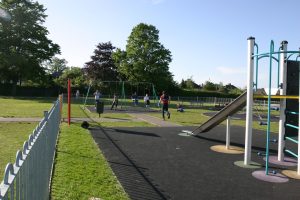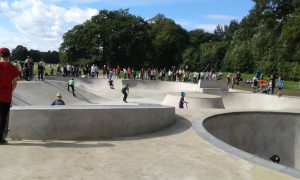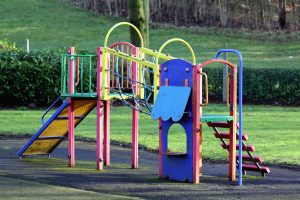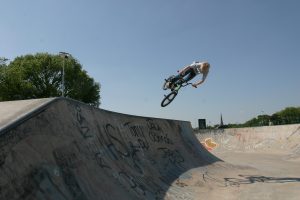



Children’s play facilities are still an important aspect of leisure provision for young people but there is also a growing recognition of the place of X-sports in local authority open spaces’ and facilities strategies. Paul Barrett explains how some of KKP’s recent projects offer some pointers for the future.
To the casual observer it is easy to overlook play facilities as one of the essential elements of an open spaces or sports facility strategy. There they are: adjacent to or part of a park or open space, quiet for much of the day during the school week until they fill with children and accompanying adults when the school day ends. However, if you are or have been one of those parents or carers, you will be all too aware of how important these play spaces are to a huge number of people, younger and older, across the community.
The stated mission of Play England is for England ‘to be a child-friendly country where all children and young people have freedom to play at home, at school, in parks and public spaces…where all children and young people can regularly play and have the freedom (time, space, permission and opportunity) to do so’. It considers play to be ‘an essential part of every child’s life and vital for the enjoyment of childhood as well as social, emotional, intellectual and physical development’.
Play needs assessments and strategies often function as a starting point for consideration of facility provision in a wider context – sometimes as a stand-alone process but most often as part of an open spaces’ strategy. KKP’s extensive experience in this field includes recent play strategies for Reading, Dudley and South Somerset. Each of these is a good example of how play provision is about much more than the installation and maintenance of equipment.
First and foremost, it is vital to consider play sites as part of a whole environment. This starts with an assessment of supply and demand: has the area (usually a local authority area) got sufficient provision of the right scale and quality in the right places to provide for the communities that need them now. We then consider population growth and projected housing development and the extent to which they are going to create greater demand in the future?
These judgements are not subjective. Fields in Trust provides guidance and recommendations for different catchment areas for play provision, which offers a useful starting point. In its guidance, play areas are generally classified as LEAPS (local equipped areas of play) or the normally larger NEAPS (neighbourhood equipped areas of play). Each of which reflects likely requirements for space and facility provision. Having evaluated what is there, we review and analyse the catchment areas they serve verifying the extent to which provision can be deemed to be sufficient and accessible to key local communities and populations.
Provision gaps and the quality of what is ‘on site’ is then evaluated: is it well-located (in the right place!), visible, well-lit, safe? Are the facilities and equipment in place appropriate? Is the condition not only of the available equipment but of the surrounds, surfaces and adjacent spaces and amenities good or poor? Should/could it be replaced, reimagined or even relocated?
If there are deficiencies, we consider what can be done to meet the standards of the guidance and the expectations of local communities. However, the answers to such questions are rarely quick or simple.
Quality assessment of facilities is underpinned by consultation with local communities, local officers and those involved and engaged with young people and youth provision. These conversations, often delivered alongside site visits, reveal challenges and options that may not be immediately obvious to the outside eye. For example, it is not uncommon (and is often a positive idea) to locate children’s play space adjacent to basketball courts, skateparks, multi-use games areas (MUGAs), and informal football provision.
On occasions, however, the use of sports play spaces can be dominated by specific groups or sometime predominantly male users – which can then impact perceptions of play provision accessibility and safety. This prompts questions about what can be done to improve the relevance and quality of provision for disabled people or to actively encourage women’s and girls’ usage and activities. This encompasses what facilities (and combinations thereof) might work best and how spaces can be made welcoming for everyone who might want to use them. Sport England has published useful guidance on how to make facilities look, feel and be safer for women and girls.
In addition, while provision of facilities and activities for young people is often well supported by local residents, there can be an underlying assumption among some that ‘youth provision’ is inevitably accompanied by anti-social behaviour. However, frustrating such assumptions might be, they need to be discussed and addressed if strategies are to be optimally effective. This is addressed via consultation with local youth groups and those who will use specific facilities. In addition to seeking to address the concerns of residents and stakeholders, this can also work to ensure that young people ‘own’ (and are subsequently inclined to use and look after) any new play equipment installed.
Alongside play strategies, we also assess cycling and walking access and related strategies. A recent assignment for Northwest Leicestershire Council involved assessing linkages between residential areas, key places of work, education, leisure, heritage, retail and other amenities across four main areas of population. Working extensively with Sustrans, we delivered extensive consultation with local communities, stakeholders and interested groups (of which there were many) all of which asked interesting questions and made constructive suggestions – helping produce a better outcome as the strategy progressed. This was supplemented via the use of data sources as an evidence base to support route proposals. These included the Propensity to Cycle Tool, an online and interactive planning support device which provides an evidence base to inform investment in cycling.
A, just completed, KKP facility strategy assignment which falls firmly into the ‘out of the ordinary’ category is our work assessing need for action (X) sport (skateboarding, BMX, in-line skating and scootering) facilities in Manchester. Reflecting the increased profile of skateboarding and BMX following their inclusion in the Olympic Games it is intended to build on the connection with younger participants and competitors and to cater more effectively for the high level of participation and interest in the City.
In Manchester we assessed the feasibility (and the potential component elements) of a major skateboarding and freestyle BMX indoor facility as part of its elite sport provision. This process was undertaken alongside a needs assessment and the development of a strategy for provision of new and improved skate and BMX facilities at outdoor and park sites across the city.
In implementing this, the City is looking to offer a high-quality, easily accessible network of X-sport venues. These will both better serve the recreational ambitions of people in all its communities and, possibly, offer an entry point via which someone ends up on the path to elite competition and Olympic glory.
While the sports themselves are relatively new to the realm of elite and certainly Olympic competition, the planning process remains essentially the same. It incorporates in-depth data-collection, effective use of KKP’s sector-leading geographic information systems (GIS) to assess accessibility and reach into key communities plus a wide range of community-based meetings and consultation.
We gathered the views of local residents, existing facility users and interest groups, liaised with the national governing bodies of the various sports, conducted numerous site visits and extensive research to create a range of proposals and options for viable and sustainable facilities that will both stimulate use and stand the test of time.
The process also involved KKP team members assessing the approach taken to developing outdoor action sports facilities in European cities such as Malmo and Bordeaux and visiting existing indoor/outdoor skateboarding provision in Northamptonshire, Nottingham and Lancashire.
While these highly valuable learning opportunities took us out of our immediate sporting comfort zones, we are looking forward to revealing our inner X sport radical selves in due course. To provide accurate and informed assessments of the installation and maintenance costs of provision KKP worked with Abacus Associates and, given its extensive experience of skate and BMX facility design, we are confident that our team will emerge from this process with a first-class strategy and only minor grazes.
The City of Manchester is forward looking in the way in which it is considering investment in such facilities. The newly acquired elite status of X sports fits well with Manchester’s vision of itself as a national and international focal point for both elite and community sport – and play. With a large, diverse population, good regional connections and national transport links, numerous NGBs have already made it their home in and X sports are a welcome addition to the roster.
Paul Barrett is a senior consultant with KKP.